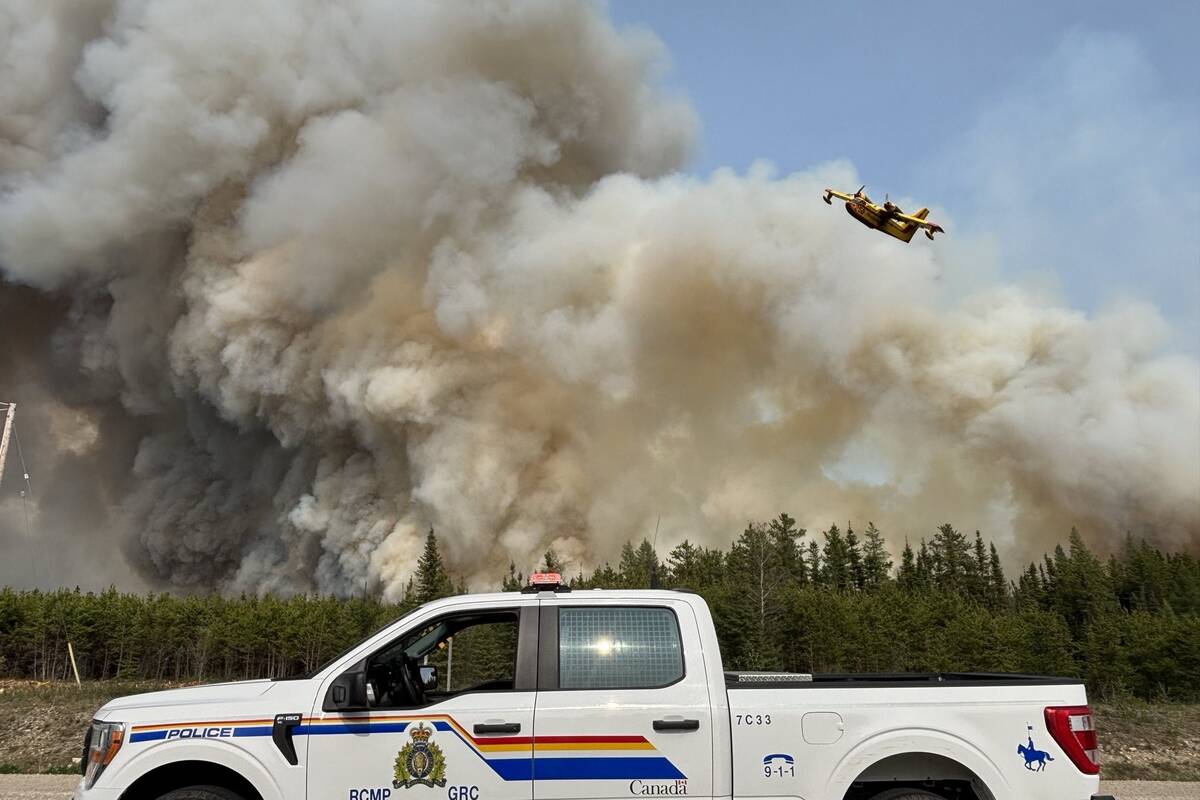Manitoba farmers urged to protect both themselves and their livestock from wildfire smoke and have a comprehensive evacuation plan ready in case of emergency situations.
Health officials are urging Manitobans to protect themselves against the impacts of breathing in too much wildfire smoke. For the province’s outdoor livestock sectors, it’s not just about human health, farmers should be thinking about their herds as well.
WHY IT MATTERS: Thousands have been evacuated so far this year as wildfires continue to rage across various parts of Manitoba. Humans, companion animals and livestock have all been displaced. Smoke also threatens to impact Manitoba crops.
Wildfire smoke poses a mounting threat to public health, even when fires aren’t visible nearby, according to the Manitoba Lung Association (MLA).
The association warns that breathing wildfire smoke can cause both immediate and lasting lung damage, with seniors, children, outdoor workers, pregnant individuals and people with respiratory conditions like asthma and COPD (chronic obstructive pulmonary disease) more at risk.
Less risk, though, does not mean no risk. A press release sent out by the organization May 30 noted that smoke can harm anyone’s lungs regardless of age or health status.
“Wildfire smoke doesn’t respect boundaries — and it doesn’t take a visible fire to put your lungs at risk,” said Juliette Mucha, president and chief executive officer of the MLA. “We’re urging Manitobans to act now, not later. Know the risks, check the air quality health index, and protect your lungs before smoke becomes a crisis.”
Health risks for farmers and outdoor workers
When smoke is heavy, farmers and others in the agricultural industry who often work outside should wear properly fitted N95 masks or P100 respirators, which provide protection against fine particulate matter in smoke.
Cloth and surgical masks are ineffective against wildfire smoke, the lung association says. Vehicle occupants should also use the recirculate vent feature while driving.
Protecting livestock from smoke exposure
Livestock and large animals suffer similar smoke effects as humans.
“Prolonged wildfire smoke exposure may cause respiratory irritation, inflammation and negatively impact cattle health and production,” said Dr. Leigh Rosengren, the Canadian Cattle Association’s chief veterinary officer. “Producers in affected areas are encouraged to monitor animals closely and contact their veterinarian if they have concerns.”
Like humans, animals can suffer immediate and long-term effects from breathing wildfire smoke, including eye and respiratory tract irritation that makes breathing difficult, according to U.S. Environmental Protection Agency (EPA) guidelines. Animals with existing heart or lung conditions and older animals face heightened risks during periods of poor air quality.
Caring for livestock during smoke events
The EPA also advises that farmers should limit strenuous activities for their animals during smoke episodes and provide plenty of fresh water near feeding areas. Animal health experts also suggest using low-dust or dust-free feeds and sprinkling or misting livestock holding areas to reduce dust exposure.
For outdoor birds, owners should consider moving them to less smoky environments such as garages or basements when air quality deteriorates.
Livestock require four to six weeks to fully recover from smoky conditions before resuming strenuous activity, the guidelines say.
Emergency evacuation planning
Preparation before wildfire season is another key part of livestock safety, tsaid the EPA. Farmers need to identify evacuation locations and maintain good barn and field conditions to reduce fire danger for horses and other livestock.
Proper record keeping becomes essential during emergencies, backed up by animal-specific identification through ear tags, tattoos, electronic microchips or brands. Farmers should maintain current photographs of high-value animals like horses and keep detailed lists of species, numbers and locations with evacuation supplies.
Evacuation kits should contain seven to 10 days’ worth of feed, supplements and water, along with blankets, halters, leads, water buckets and manure forks. Vaccination records, medical records and proof of ownership should be easily on hand.
Farmers should also identify trailer resources and train livestock to load properly. Multiple evacuation routes should be planned, with temporary shelter arrangements made at local fairgrounds, stockyards or equestrian centers.
When evacuation isn’t possible
If they can’t evacuate, farmers should move animals to preselected, cleared areas with lower fire risk. Gates should be opened and fences cut to allow animal movement. Neighbours and first responders should be notified about animal locations, the guidelines say.
Food and water supplies for 48 to 72 hours must be left behind. Automatic watering systems may fail during emergencies, the document warns farmers.
Property owners must not return until officials declare it safe to do so.
The guidelines also emphasize that human safety remains the top priority during wildfire evacuations, with animal welfare considerations secondary to protecting farmers and their families.
Source - https://www.manitobacooperator.ca













